虚拟语气归纳-整理版
- 格式:docx
- 大小:12.47 KB
- 文档页数:5
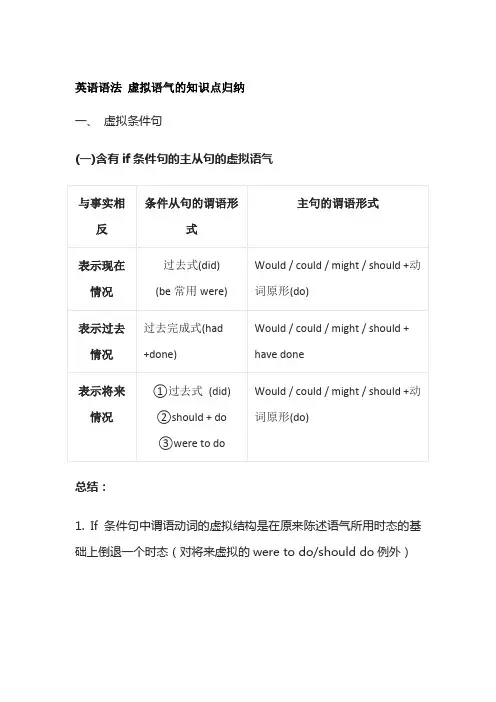
英语语法虚拟语气的知识点归纳一、虚拟条件句(一)含有if条件句的主从句的虚拟语气总结:1. If 条件句中谓语动词的虚拟结构是在原来陈述语气所用时态的基础上倒退一个时态(对将来虚拟的were to do/should do例外)2. 主句要借助于情态动词的过去式,后跟动词原形(现在或将来)或have done(过去);if条件句中只出现一个情态动词,即对将来虚拟的should.3.做此类题目时一定要分清是从句还是主句谓语动词的虚拟,还要把握好时态。
注意:1. 在虚拟条件从句中,动词“be”的过去时态一律用”were”,不用was。
2. 在虚拟条件状语中如果有were, should, had这三个词中任何一个,可省略if,把这三个词提到主语之前, 变成:were/should/had +主语+剩余成分。
3.在虚拟条件状语从句中,省略连词的倒装形式的句首不能用动词的缩略形式。
如我们可说Were I not to do., 而不能说Weren‘t I to do。
4.在表示与将来事实相反的条件句中,只能用should,而不能用would,could和might 等。
5.主句中的should通常用于第一人称,would,could以及might 可以用于各种人称eg :①If I were a bird, I could fly in the air.如果我是一只小鸟,我就能在空中飞行。
②I wish I could pass the examination.我希望我能通过考试。
在虚拟条件句中,对于与将来事实相反的情形,请注意以下几点:(1)条件从句表示的内容与将来事实相反,实为对将来情况的推测,用过去时表示虚拟;(2)条件从句谓语除用过去式外,有时也用“should+动词原形(表示可能性极小,常译为“万一”)”或“were to+动词原形(表示与将来事实相反的假设)”;(3)条件从句使用“should+动词原形”这样的谓语形式时,主句谓语除可用“should (would, could, might)+动词原形”这样的虚拟语气形式外,也可用直陈语气或祈使语气。
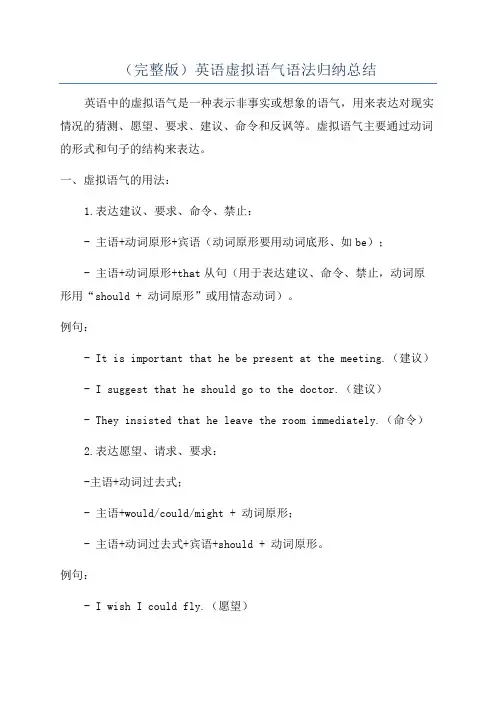
(完整版)英语虚拟语气语法归纳总结英语中的虚拟语气是一种表示非事实或想象的语气,用来表达对现实情况的猜测、愿望、要求、建议、命令和反讽等。
虚拟语气主要通过动词的形式和句子的结构来表达。
一、虚拟语气的用法:1.表达建议、要求、命令、禁止:- 主语+动词原形+宾语(动词原形要用动词底形、如be);- 主语+动词原形+that从句(用于表达建议、命令、禁止,动词原形用“should + 动词原形”或用情态动词)。
例句:- It is important that he be present at the meeting.(建议)- I suggest that he should go to the doctor.(建议)- They insisted that he leave the room immediately.(命令)2.表达愿望、请求、要求:-主语+动词过去式;- 主语+would/could/might + 动词原形;- 主语+动词过去式+宾语+should + 动词原形。
例句:- I wish I could fly.(愿望)- I would appreciate it if you could help me.(请求)3.表示虚拟条件:- If条件从句中的谓语动词用过去完成时,主句用would/should/might/could + have + 过去分词;- If条件从句中的谓语动词用过去时,主句用would/should/could + 动词原形。
例句:- If I had known his phone number, I would have called him.(虚拟条件)- If you had listened to me, we could have finished the project earlier.(虚拟条件)4.表达建议、要求、祝愿:- If only内部称述 + 主语 + 过去式。
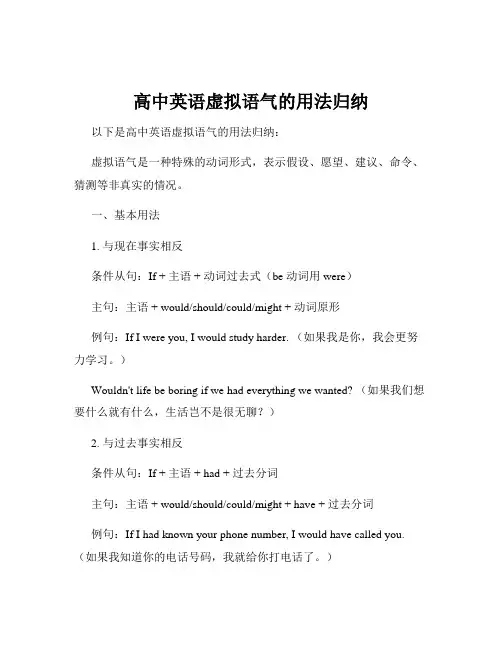
高中英语虚拟语气的用法归纳以下是高中英语虚拟语气的用法归纳:虚拟语气是一种特殊的动词形式,表示假设、愿望、建议、命令、猜测等非真实的情况。
一、基本用法1. 与现在事实相反条件从句:If + 主语 + 动词过去式(be 动词用 were)主句:主语 + would/should/could/might + 动词原形例句:If I were you, I would study harder. (如果我是你,我会更努力学习。
)Wouldn't life be boring if we had everything we wanted? (如果我们想要什么就有什么,生活岂不是很无聊?)2. 与过去事实相反条件从句:If + 主语 + had + 过去分词主句:主语 + would/should/could/might + have + 过去分词例句:If I had known your phone number, I would have called you. (如果我知道你的电话号码,我就给你打电话了。
)Couldn't you have done better if you had tried harder? (如果你再努力些,难道不能做得更好吗?)3. 与将来事实相反条件从句:① If + 主语 + 动词过去式② If + 主语 + were to + 动词原形③ If + 主语 + should + 动词原形主句:主语 + would/should/could/might + 动词原形例句:If it rained tomorrow, we would stay at home. (如果明天下雨,我们就待在家里。
)If she were to come here tomorrow, I would be very happy. (如果她明天来这儿,我会非常高兴。
)If he should fail in the exam, how disappointed his parents would be!(要是他考试不及格,他父母该多失望啊!)二、固定搭配1. wish 后的宾语从句与现在事实相反:从句用一般过去时与过去事实相反:从句用过去完成时与将来事实相反:从句用 would/could + 动词原形例句:I wish I were as tall as you. (我希望我和你一样高。
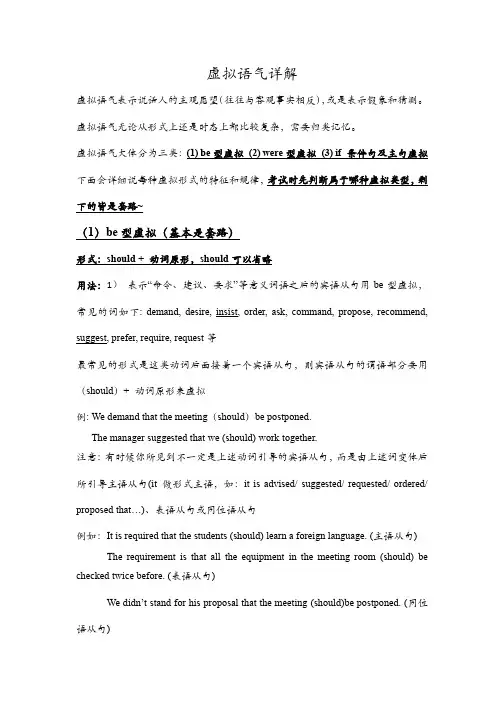
虚拟语气详解虚拟语气表示说话人的主观愿望(往往与客观事实相反),或是表示假象和猜测。
虚拟语气无论从形式上还是时态上都比较复杂,需要归类记忆。
虚拟语气大体分为三类:(1) be型虚拟(2) were型虚拟(3) if 条件句及主句虚拟下面会详细说每种虚拟形式的特征和规律,考试时先判断属于哪种虚拟类型,剩下的皆是套路~(1)be型虚拟(基本是套路)形式:should + 动词原形,should可以省略用法:1)表示“命令、建议、要求”等意义词语之后的宾语从句用be型虚拟,常见的词如下: demand, desire, insist, order, ask, command, propose, recommend, suggest, prefer, require, request等最常见的形式是这类动词后面接着一个宾语从句,则宾语从句的谓语部分要用(should)+ 动词原形来虚拟例: We demand that the meeting(should)be postponed.The manager suggested that we (should) work together.注意:有时候你所见到不一定是上述动词引导的宾语从句,而是由上述词变体后所引导主语从句(it做形式主语,如:it is advised/ suggested/ requested/ ordered/ proposed that…)、表语从句或同位语从句例如:It is required that the students (should) learn a foreign language. (主语从句) The requirement is that all the equipment in the meeting room (should) be checked twice before. (表语从句)We didn’t stand for his proposal that the meeting (should)be postponed. (同位语从句)只要看到句中有上述动词或其变体,不管词性怎么变、句型怎么变,都用be型虚拟!特例:suggest和insist这两个比较特殊,当suggest作“暗示、表明、说明”讲,insist作“坚持说”讲,后面一般跟的是客观事实,不需要虚拟~这是一个比较重要的考点,体会下面两组句子:We all suggest that a lab (should) be built. 我们都建议建一个实验室。
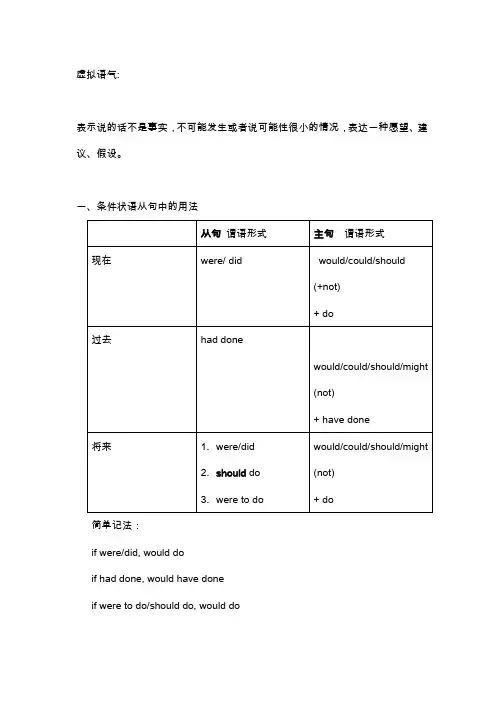
虚拟语气:表示说的话不是事实,不可能发生或者说可能性很小的情况,表达一种愿望、建议、假设。
一、条件状语从句中的用法简单记法:if were/did, would doif had done, would have doneif were to do/should do, would do举例:If I were you, I would do nothing about it.If you had taken your teacher’s advice, you wouldn’t have made such a mistake.If it were to/ should rain tomorrow(表示降水率很低),they wouldn’t go shopping.附注:虚拟语气,条件状从倒装状语从句中,去掉if, 提前were/ had/ should如:If I were you, I would give up.→Were I you, I would give upIf you had taken the advice, you would have….→Had you taken the advice, you would have…If the world should come to an end,……→Should the world come to an end……另外,without, but for, otherwise构成的条件状语从句中,也有含蓄的虚拟语气But for the popularization of electricity, we would lead a whole different life today.(popularization 普及,publicity 宣传)Without your help, I would have failed.We’ll go earlier, otherwise we wouldn’t get a seat. (表示可能性小)但其实,高中英语考试也常考:错综虚拟语气条件句即:假设条件状从发生的时间与所假设的谓语动词不一致,此时,主句和从句要根据各自的时间而定。
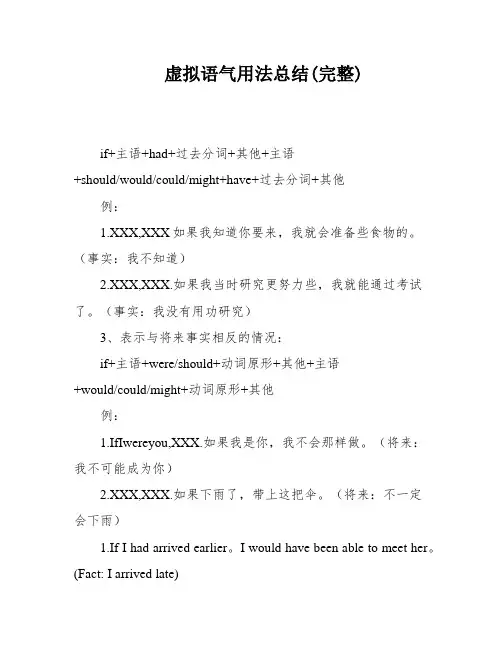
虚拟语气用法总结(完整)if+主语+had+过去分词+其他+主语+should/would/could/might+have+过去分词+其他例:1.XXX,XXX如果我知道你要来,我就会准备些食物的。
(事实:我不知道)2.XXX,XXX.如果我当时研究更努力些,我就能通过考试了。
(事实:我没有用功研究)3、表示与将来事实相反的情况:if+主语+were/should+动词原形+其他+主语+would/could/might+动词原形+其他例:1.IfIwereyou,XXX.如果我是你,我不会那样做。
(将来:我不可能成为你)2.XXX,XXX.如果下雨了,带上这把伞。
(将来:不一定会下雨)1.If I had arrived earlier。
I would have been able to meet her。
(Fact: I arrived late)2.If he had XXX my advice。
he would not have made such a mistake。
(Fact: He didn't listen to me)3.If he were to come here tomorrow。
I would talk to him。
(Fact: It's XXX he will come)In expressing ns。
orders。
requests。
etc。
the subjunctive mood is often used in the object clause。
with the verb in the form of "should + infinitive," which can be omitted.Other uses of XXX:1.The subjunctive mood is used in the object clause after "wish" to express a XXX fact。
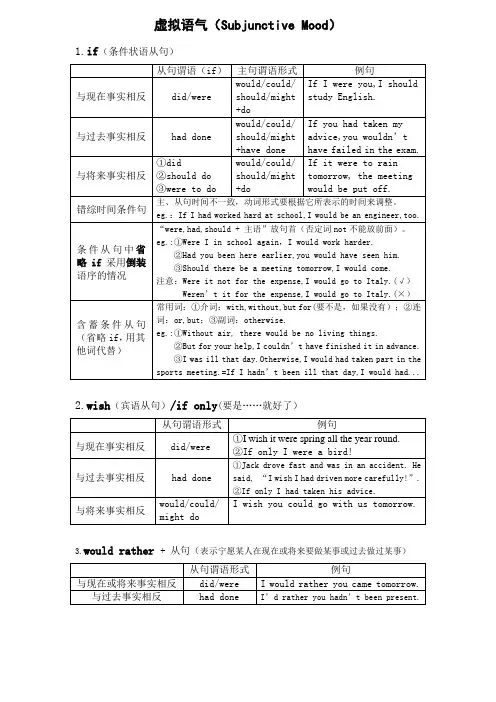
虚拟语气(Subjunctive Mood)1.if(条件状语从句)2.wish(宾语从句)/if only(要是……就好了)3.would rather+ 从句(表示宁愿某人在现在或将来要做某事或过去做过某事)4.as if/as though,even if/though + 从句--------------------------------------------------------------------- 5.在表示“坚持、要求、命令、建议”之类的动词后的宾语从句中,用“(should)+动词原形”。
6.虚拟语气用于主语从句7.虚拟语气用于表语从句、同位语从句 [用(should)+动词原形]8.虚拟语气用于定语从句这种从句常用在It is (high) time (that)...句型中,定语从句的谓语动词用过去式或should + 动词原形(should不能省略,be用were来表示),意【好题珍藏】1.Grace doesn’t want to move to New York because she thinks if she there, she wouldn’t be able to see her parents very often. (Pano M6 P16:15) A.lives B.would live C.has lived D.were to live【解析】主句说明了客观事实,if从句是对将来事实的假设。
见“1.if(条件状语从句)——与将来事实相反”。
【答案】D2.If Mr.Dewey present,he would have offered any possible assistance to the people there. (Pano M6 P16:16) A.were B.had been C.should be D.was【解析】见“1.if(条件状语从句)——与过去事实相反”。
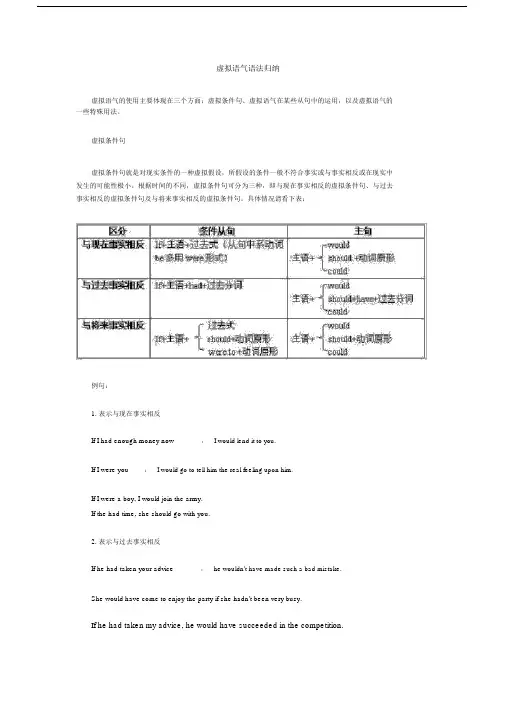
虚拟语气语法归纳虚拟语气的使用主要体现在三个方面:虚拟条件句、虚拟语气在某些从句中的运用,以及虚拟语气的一些特殊用法。
虚拟条件句虚拟条件句就是对现实条件的一种虚拟假设,所假设的条件一般不符合事实或与事实相反或在现实中发生的可能性极小。
根据时间的不同,虚拟条件句可分为三种,即与现在事实相反的虚拟条件句、与过去事实相反的虚拟条件句及与将来事实相反的虚拟条件句。
具体情况请看下表:例句:1.表示与现在事实相反If I had enough money now,I would lend it to you.If I were you,I would go to tell him the real feeling upon him.If I were a boy, I would join the army.If the had time, she should go with you.2.表示与过去事实相反If he had taken your advice,he wouldn't have made such a bad mistake.She would have come to enjoy the party if she hadn't been very busy.If he had taken my advice, he would have succeeded in the competition.3.表示与将来事实相反I would go shopping with you if it were to be Sunday tomorrow.If he were to be given another chance to do it again,he could certainly achieve more.If it were to rain tomorrow, the football match would be put off.1.虚拟条件句的倒装在虚拟条件句中,为了强调所假设条件的虚拟性,或突出说话人的一种主观愿望,虚拟条件句可用倒装结构。
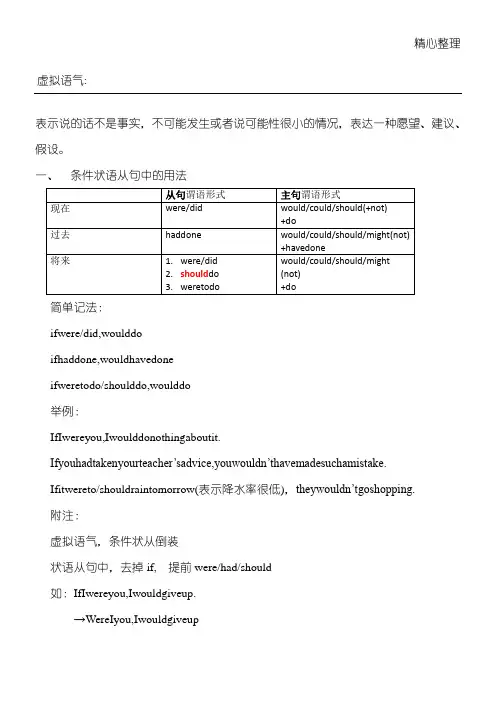
精心整理虚拟语气:表示说的话不是事实,不可能发生或者说可能性很小的情况,表达一种愿望、建议、假设。
一、条件状语从句中的用法附注:虚拟语气,条件状从倒装状语从句中,去掉if, 提前were/had/should如:IfIwereyou,Iwouldgiveup.→WereIyou,IwouldgiveupIfyouhadtakentheadvice,youwouldhave….→Hadyoutakentheadvice,youwouldhave…Iftheworldshouldcometoanend,……→Shouldtheworldcometoanend……另外,without,butfor,otherwise构成的条件状语从句中,也有含蓄的虚拟语气Butforthepopularizationofelectricity,wewouldleadawholedifferentlifetoday.(popularization普及,publicity宣传Withoutyourhelp,Iwouldhavefailed.但其实,高中英语考试也常考:错综虚拟语气条件句据各自的时间而定。
举例:(layout规划、设计、安排、陈设、摆放…layoutn.布局、规划)二、特殊句式:1.wish+宾语从句Iwishmyparentswouldn’tpunishme.IwishIhad n’t madesuchanirrevocablemistake.(irrevocable不可撤销、不可以挽回的)2.「十个词」一坚持:insist(表示坚持主张、认为,不表示坚持说)二命令:order,command三建议:advise,propose,suggest(表示建议,不表示表明、显示、暗示)四要求:这些动词后面的宾语从句要使用例:WesuggestedthatTom(should)have(beforelong,不久之后尝试翻译:他坚决要求例It’sanorderthatthesoldiersobeytheru lesinthearmy.Mysuggestionisthat everyone ofusthree finish onepartofthisprojectandthenwein tegratethemtogether.(integrate整合)3.wouldrather宁愿从句当中谓语形式Iwouldratheryoupaidmenow. Iwouldratheryouhadbeentothemovieinsteadofme.Don’tcometoday,I wouldratheryoucametomorrow.4.部分Asif/though句子好像、似乎Tomtoldmethisfairytaleinamannerasifithadhappenedforrealyesterday.5.Ifonly…….要是…就好了It’sessentialthatwemasteraforeignlanguagewhendoinginternationaltradea ndbusiness.(essential必要的、本质的、基本的…..)8.情态动词+havedonewouldhavedone本来要做couldhavedone本能够做(却没做)mighthavedone本来可能should/oughttohavedone本来应该做shouldn’t/oughtn’ttohavedone本来不应该做needn’thavedone本来不必要做你本来不应该告诉她真相。
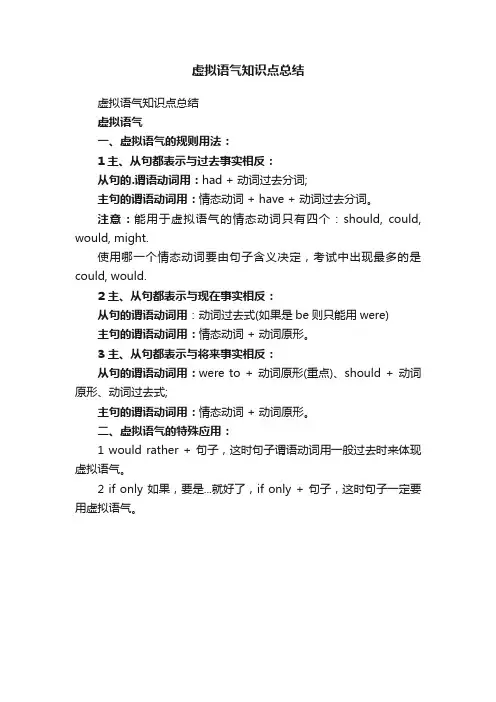
虚拟语气知识点总结
虚拟语气知识点总结
虚拟语气
一、虚拟语气的规则用法:
1主、从句都表示与过去事实相反:
从句的.谓语动词用:had + 动词过去分词;
主句的谓语动词用:情态动词 + have + 动词过去分词。
注意:能用于虚拟语气的情态动词只有四个:should, could, would, might.
使用哪一个情态动词要由句子含义决定,考试中出现最多的是could, would.
2 主、从句都表示与现在事实相反:
从句的谓语动词用:动词过去式(如果是be则只能用were)
主句的谓语动词用:情态动词 + 动词原形。
3 主、从句都表示与将来事实相反:
从句的谓语动词用:were to + 动词原形(重点)、should + 动词原形、动词过去式;
主句的谓语动词用:情态动词 + 动词原形。
二、虚拟语气的特殊应用:
1 would rather + 句子,这时句子谓语动词用一般过去时来体现虚拟语气。
2 if only 如果,要是...就好了,if only + 句子,这时句子一定要用虚拟语气。
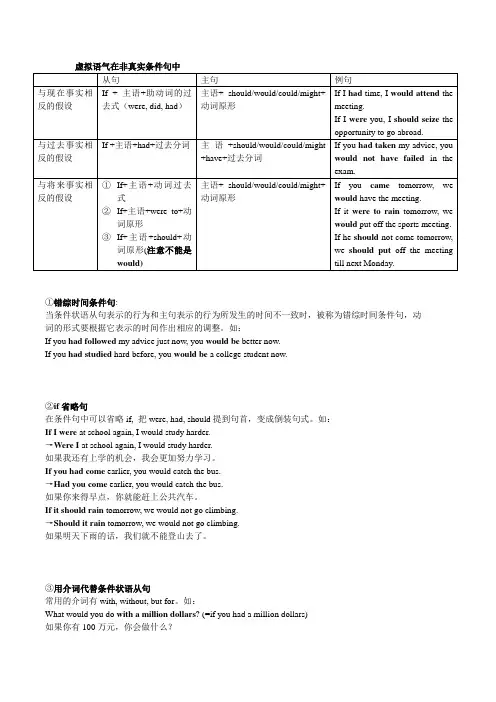
虚拟语气在非真实条件句中①错综时间条件句:当条件状语从句表示的行为和主句表示的行为所发生的时间不一致时,被称为错综时间条件句,动词的形式要根据它表示的时间作出相应的调整。
如:If you had followed my advice just now, you would be better now.If you had studied hard before, you would be a college student now.②if省略句在条件句中可以省略if, 把were, had, should提到句首,变成倒装句式。
如:If I were at school again, I would study harder.→Were I at school again, I would study harder.如果我还有上学的机会,我会更加努力学习。
If you had come earlier, you would catch the bus.→Had you come earlier, you would catch the bus.如果你来得早点,你就能赶上公共汽车。
If it should rain tomorrow, we would not go climbing.→Should it rain tomorrow, we would not go climbing.如果明天下雨的话,我们就不能登山去了。
③用介词代替条件状语从句常用的介词有with, without, but for。
如:What would you do with a million dollars? (=if you had a million dollars)如果你有100万元,你会做什么?We couldn’t have finished the work ahead of time without your help. (=if we hadn’t got your help) 没有你的帮助,我们不可能提前完成这项工作。
虚拟语气:表示说的话不是事实,表示说的话不是事实,不可能发生或者说可能性很小的情况,不可能发生或者说可能性很小的情况,不可能发生或者说可能性很小的情况,表达一种愿望、表达一种愿望、表达一种愿望、建建议、假设。
议、假设。
一、条件状语从句中的用法一、条件状语从句中的用法从句 谓语形式谓语形式主句 谓语形式谓语形式现在现在were/ didwould/could/should (+not) + do 过去过去 had donewould/could/should/might (not)+ have done将来将来1. were/did2. should do3. were to dowould/could/should/might (not) + do简单记法:简单记法:if were/did, would doif had done, would have done if were to do/should do, would do举例:举例:If I were you, I would do nothing about it.If you had taken your teacher’s advice, you wouldn’t have made such a mistake. If it were to/ should rain tomorrow(表示降水率很低),they wouldn’t go shopping.附注:附注:虚拟语气,条件状从倒装虚拟语气,条件状从倒装状语从句中,去掉if, 提前were/ had/ should 如:If I were you, I would give up. →Were I you, I would give upIf you had taken the advice, you would have…. →Had you taken the advice, you would have… If the world should come to an end,…… →Should the world come to an end……另外,without, but for, otherwise 构成的条件状语从句中,也有含蓄的虚拟语气构成的条件状语从句中,也有含蓄的虚拟语气 But for the populariza on of electricity, we would lead a whole different life today. (populariza on 普及,publicity 宣传) Without your help, I would have failed.We’ll go earlier, otherwise we wouldn’t get a seat. (表示可能性小)(表示可能性小)但其实,高中英语考试也常考:但其实,高中英语考试也常考:错综虚拟语气条件句错综虚拟语气条件句 即:即:假设条件状从发生的时间与所假设的谓语动词不一致,此时,主句和从句要根据各自的时间而定。
英语虚拟语气知识点总结一、虚拟语气的概念:虚拟语气,是指表示说话者所说的情况并非现实或已经发生,或在说话时还不确定是否实现的一种语态。
其特点是句子中的动词形式属于虚拟语气。
二、虚拟语气的表达:1. 条件虚拟语气:表示与现在或未来事实相反的虚拟情况。
(1)主句用过去时,从句用过去完成时。
If I had known the truth, I would not have believed him.(如果我知道了真相,我就不会相信他了。
)(2)主句用过去式,从句用“had+过去分词”。
If he had worked harder, he would have passed the exam.(如果他更加努力学习的话,他就能够通过这个考试。
)2. 虚拟假设语气:表示想像中与现在或将来相反的事情。
(1)主句用过去时,从句用过去式。
If I knew his address, I would go there and see him now.(如果我知道他的地址的话,我现在就会去找他了。
)(2)主句用were,表示与过去的虚拟情况相反。
If I were you, I would study hard.(如果我是你的话,我会好好学习。
)3. 祝愿虚拟语气:表示转化为现实的愿望。
(1)主句用过去式,从句用过去完成式。
I wish I had known him earlier.(我希望我更早认识他。
)(2)主句用过去式,从句用would / could +动词原形。
I wish he could help me with my English.(我希望他能够帮助我学习英语。
)4. 建议虚拟语气:表示对假设的结果的建议。
If I were you, I would work harder.(如果我是你的话,我会更加努力工作。
)5. 明确表示否定的虚拟语气:If they didn’t arrive on time, they would miss the plane.(如果他们没按时到达,他们将会错过飞机。
虚拟语气用法归纳英语的动词一般可带有三种不同的语气:陈述语气,祈使语气和虚拟语气。
不同的语气用动词的不同形式(有的还借助句法形式)来表示。
一、虚拟条件句条件句有两类:一类是真实条件句,一类是虚拟条件句如果假设的情况是有可能发生的,就是真实条件句,谓语用陈述语气。
If you don 'work hard, you will fail.If it is fine tomorrow, we will go for a picnic.如果假设的情况过去、现在、将来都不存在,则为虚拟语气虚拟条件句和对应主句的动词形式列表:1•与现在事实相反的虚拟What would you do if you won the lottery?If I were you, I would seize the cha nee to go abroad.If I had a lot of money no w, I would travel around the world.2. 与过去事实相反的虚拟If you had bee n here yesterday, you would have see n her.If he had driven more carefully, he would not have had the car accident yesterday.3. 与将来事实相反的虚拟If it were to rain/should rai n/rai ned tomorrow, our pla n would be put off.If we were to pic nic, we would not be able to help.二、错综、混合虚拟语气通常,在上面表格里反映的是非真实条件句的虚拟语气模式,从句和主句的谓语动词时间是一致的,如果两者时间不一致,此时就是混合型虚拟语气。
混合型虚拟语气的使用要求“各自为政”,即从句和主句根据各自假设的时间不同,采用上面表格中对应的的谓语动词形式。
英语虚拟语气笔记整理虚拟语气,又叫做条件句,是英语中一种独特的句式,它可以反映出句子的说话者对说话内容的态度,表示句子没有实现,或表达的是假设的情况,它的特点是用过去时代替现在时,以表示说话内容是不可能,不确定,或与事实相反的情况。
虚拟语气在英语中有许多表达形式,这些形式涉及到语法形式和口语表达形式。
本文将对英语中虚拟语气的表达形式及其使用方法进行整理,以期更好地理解并掌握英语的虚拟语气。
一、英语虚拟语气的形式1、 should虚拟语气例句:I should go home now.这种句式也叫做对称句式,使用时主语可以用第一人称或第三人称,谓语动词用过去式表示虚拟,should此句式中表达“应该”,表示说话内容是虚拟的,不被发生。
2、 were虚拟语气例句:If I were you, I would study harder.这种句式又叫做倒装句式,其中 if连词,were过去式,表示说话内容是假设的,不是现实的,说话者所表达的意思是可能的,但不一定会发生。
3、带 had虚拟语气例句:I would be rich if I had won the lottery.这种句式又叫做固定搭配句式,其中 if连词,had过去分词,表示说话内容是不可能实现的,不是现实的,说话者所表达的意思是可能的,但事实上没有发生。
4、带 would虚拟语气例句:She said she would come here soon.这种句式又叫做虚拟句式,其中所用的would示“愿意”,表示说话内容不确定,说话者所表达的意思是可能的,但也有可能不会发生。
二、英语虚拟语气的使用1、虚拟句式中,表示一种假设情况,即要表示一种不确定的情况,那么需要使用虚拟语气,如:If I had a million dollars, I would travel around the world.2、虚拟句式中,表示一种愿望,即表达的是一种愿望或期望,那么需要使用虚拟语气,如:I wish I had more time to study.3、虚拟句式中,表示一种建议,即表达的是一种建议或建议,那么需要使用虚拟语气,如:You should go and see your doctor.4、在虚拟句式中,表示一种职责或义务,即表达的是一种职责或义务,那么需要使用虚拟语气,如:We should work hard and make contributions to the society.三、总结本文通过对英语虚拟语气的表达形式及其使用方法进行整理,总结出英语虚拟语气的形式有带 should虚拟语气、带 were虚拟语气、带 had虚拟语气和带 would虚拟语气四种形式,此外,在使用虚拟语气时,要根据句子内容来选择合适的表达形式,如需要表达一种假设情况、愿望、建议或职责,则需要使用虚拟语气。
虚拟语气(the subjunctive mood)用法归纳第一部分:语气的定义和种类1、语气(mood)语气是动词的一种形式,表示说话人对某一行为或事情的看法和态度。
2、语气的种类⑴陈述语气:表示动作或状态是现实的、确定的或符合事实的,用于陈述句、疑问句和某些感叹句。
如:①There are two sides to every question. 每个问题都有两个方面。
②Were you busy all day yesterday? 昨天一整天你都很忙吗?③How good a teacher she is! 她是多好的一位老师啊!⑵祈使语气:表示说话人对对方的请求或命令。
如:①Never be late again! 再也不要迟到了。
②Don’t forget to turn off the light. 别忘了关灯。
⑶虚拟语气:表示动作或状态不是客观存在的事实,而是说话人的主观愿望、假设或推测等。
如:①If I were a bird, I could fly in the air. 如果我是一只小鸟,我就能在空中飞行。
②I wish I could pass the examination. 我希望我能通过考试。
③May you succeed! 祝您成功!第二部分:简单句中的虚拟语气一、情态动词的过去式用于现在时态时,表示说话人的谦虚、客气、有礼貌、或委婉的语气,常用于日常会话中。
如:⑴Would you be kind enough to show me the way to the post office?请你告诉我去邮局的路好吗?⑵It would be better for you not to stay up too late. 你最好别熬夜到很晚。
二、表祝愿。
1、常用“may+动词原形”表示祝愿,但愿,may须置于句首(多用于正式文体中)。
如:⑴May good luck be yours! 祝你好运!⑵May you be happy! 祝你快乐!⑶May you do even better! 祝你取得更大成就!⑷May you have a good time. 祝愿你玩的痛快。